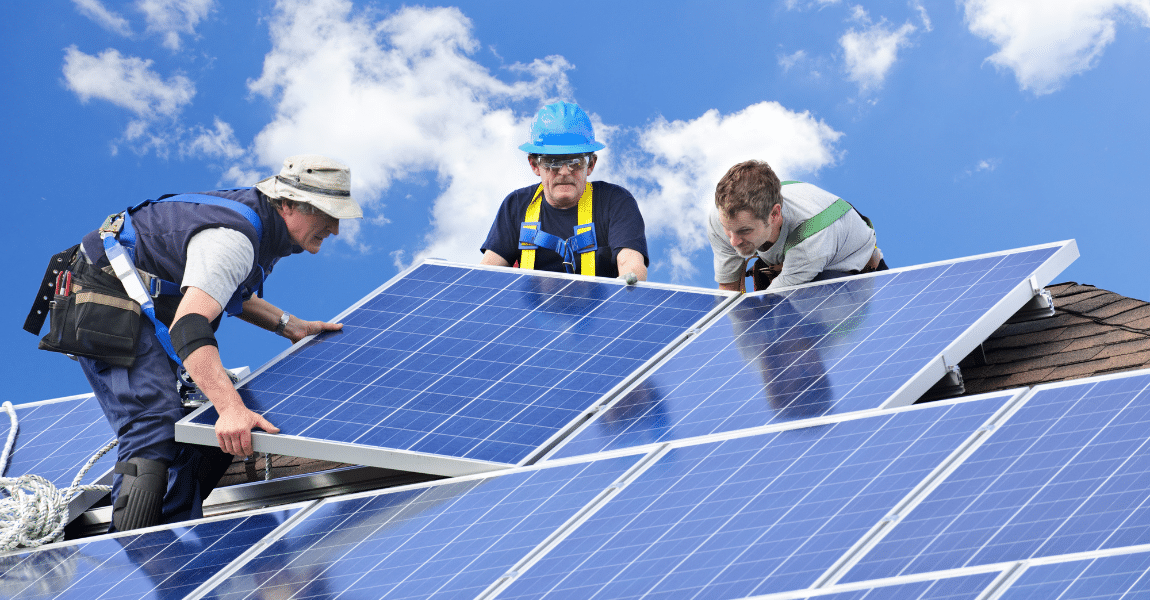Are you considering making the switch to solar energy? Going solar offers a range of benefits, including lower electricity bills, reduced carbon emissions, and increased energy independence. However, before you make the investment in solar panel installation, it’s important to understand the different types of solar panels, how to choose the right system for your home, and how to find the right installer.
In this article, we will provide you with everything you need to know about going solar and solar panel installation. We’ll start by discussing the benefits of going solar, including the financial and environmental advantages.
We’ll then dive into the different types of solar panels available, including their efficiency ratings and costs. From there, we’ll guide you through the process of choosing the right solar panel system for your home, including considerations such as your energy usage and budget.
Finally, we’ll discuss how to find the right solar panel installer and walk you through the installation process. By the end of this article, you’ll have all the information you need to make an informed decision about going solar and installing solar panels on your home.
The Benefits of Going Solar
You’ll love the benefits of going solar, like lower electricity bills and reducing your carbon footprint. Investing in solar panels allows you to generate your own electricity, which means you can reduce your dependency on the grid. This translates to financial savings in the long run, as you’ll be using less electricity from your utility company and may even be able to sell excess electricity back to them.
In addition to financial savings, going solar also has a significant positive impact on the environment. By using renewable energy, you reduce your carbon footprint and contribute to a cleaner, more sustainable future. Solar panels don’t emit any pollutants or greenhouse gases, making them an environmentally-friendly choice. By going solar, you can also inspire others to make the switch to renewable energy, creating a ripple effect that benefits the planet.
Going solar also adds value to your home. Installing solar panels increases your property’s resale value and makes it more attractive to potential buyers. This means that the investment you make in solar panels is not only financially beneficial in the long run, but also adds value to your property.
Overall, the benefits of going solar are numerous, making it a smart choice for both your wallet and the environment.
Understanding Different Types of Solar Panels
There are various types of solar panels, each with its unique features and benefits. When it comes to the composition of solar panels, there are two main types: thin film and crystalline.
Thin film solar panels are made by depositing thin layers of photovoltaic materials on a substrate. They’re lighter and more flexible than crystalline panels, making them easier to install and transport. However, they’re less efficient and have a shorter lifespan than crystalline panels.
On the other hand, crystalline solar panels are made from silicon cells that are cut from a single crystal or multiple crystals. They’re more efficient than thin film panels and have a longer lifespan. There are two types of crystalline panels: monocrystalline and polycrystalline.
Monocrystalline panels are made from a single crystal, giving them a uniform appearance and higher efficiency. However, they’re more expensive than polycrystalline panels. Polycrystalline panels are made from multiple crystals, giving them a speckled appearance. They’re less efficient than monocrystalline panels but are more affordable.
When deciding which type of solar panel to install, it’s important to consider your budget, energy needs, and space availability. Thin film panels may be a good option if you have limited space or a tight budget. However, crystalline panels may be a better choice if you want a more efficient and longer-lasting system.
When it comes to crystalline panels, the choice between monocrystalline and polycrystalline depends on your priorities. If you want the highest efficiency and are willing to pay a premium, go for monocrystalline. Polycrystalline may be the way to go if you want a more affordable option.
Choosing the Right Solar Panel System for Your Home
If you’re looking to power your home with solar energy, choosing a solar panel system that fits your specific energy needs and budget is important.
When it comes to sizing considerations, you’ll need to determine how much electricity your household consumes on a daily basis. This will help you choose a system with the right number of solar panels and the appropriate output.
Another factor to consider is your financing options. Solar panel installation can be a significant investment, but various financing options are available to make it more affordable. You may be able to take advantage of government incentives, such as tax credits, or financing programs offered by solar panel companies.
Make sure to do your research and compare different options before making a decision.
Ultimately, choosing the right solar panel system for your home requires careful consideration of your energy needs, budget, and financing options. With the right system in place, you can enjoy the benefits of clean, renewable energy and reduce your reliance on traditional power sources.
Finding the Right Solar Panel Installer
Once you’ve decided to switch to solar energy, finding a reliable installer who can handle the project is crucial. The right solar panel installer will ensure that your solar panel system is installed properly and efficiently, saving you money on energy bills in the long run.
When looking for an installer, consider their industry experience and qualifications. Cost considerations are an important factor when choosing a solar panel installer. Look for a company that offers competitive pricing and financing options. Be wary of installers who offer significantly lower prices than others, as they may be cutting corners on the quality of equipment or installation.
It’s also important to research any incentives or rebates available in your area to help offset the initial cost of installation. Certifications and accreditation are also essential when choosing a solar panel installer. Look for a company that has a certification from the North American Board of Certified Energy Practitioners (NABCEP). This certification ensures that the installer has undergone rigorous training and meets industry standards.
Additionally, check if the installer has any accreditations from reputable organizations, such as the Better Business Bureau or the National Renewable Energy Laboratory. These certifications and accreditations guarantee that the installer is trustworthy and reliable.
The Solar Panel Installation Process
Get excited about the journey to clean energy with the step-by-step process of setting up solar panels in your home.
The first step in the installation process is to have an on-site evaluation done by a professional solar panel installer. This evaluation will help determine the optimal location for the solar panels, the number of panels needed, and the estimated cost of the installation.
Once the evaluation is complete and you’ve received a quote, it’s time to decide. Consider the cost considerations, such as the upfront cost of the installation, financing options, and the potential savings on your energy bill. Also, think about the environmental impact of switching to solar energy. By using clean energy, you’re reducing your carbon footprint and helping to protect the planet.
If you decide to move forward with the installation, the next step is to schedule the installation date. The installation typically takes one to three days, depending on the size of the system. During this time, the installers will mount the solar panels on your roof or in your yard, connect the panels to the inverter, and connect the inverter to your home’s electrical system.
Once the installation is complete, you can enjoy the benefits of clean, renewable energy and the savings on your energy bill.
Maintaining and Maximizing Your Solar Panel System’s Performance
To ensure peak performance of your solar panel system, regular maintenance is essential. One of the most important aspects of maintenance is keeping your solar panels clean. Dirty panels can significantly reduce their efficiency, so developing a cleaning routine is important. You can use a soft-bristled brush or a squeegee to remove any dirt or debris from the panels. Additionally, you may want to invest in a specialized cleaning solution to help keep your panels in pristine condition.
Another way to maintain and maximize your solar panel system’s performance is by using monitoring tools. These tools can help you keep track of your system’s output and identify any issues that may arise. For example, a monitoring app can check your system’s performance and receive alerts for any problems. This can help you address issues quickly and prevent major damage to your solar panel system.
Regular maintenance and monitoring are crucial to maintaining the performance of your solar panel system. By keeping your panels clean and using monitoring tools, you can ensure your system operates at peak efficiency. This will save you money on energy bills and help you reduce your carbon footprint and contribute to a more sustainable future.
Frequently Asked Questions
What happens to my solar panels during a power outage?
During a power outage, your solar panels will not generate electricity unless you have a backup system installed. Proper solar panel maintenance can ensure your backup system is in good working order and ready to provide electricity when you need it most.
How do I calculate the return on investment for my solar panel system?
To calculate savings and determine the payback period of your solar panel system, conduct a financial analysis with an ROI calculation. This will help you make an informed decision about investing in solar energy.
Are there any government incentives or tax credits available for installing solar panels?
You can benefit from solar panel cost by taking advantage of government incentives and tax credits. Renewable energy policies encourage homeowners to switch to solar power, making it more affordable and financially rewarding.
How do I know if my home is suitable for solar panel installation?
To determine if your home is suitable for solar panel installation, a roof assessment and shading analysis must be conducted by a licensed professional. This will determine if your roof is structurally sound and receives enough sunlight for optimal energy production.
Can I add more solar panels to my system in the future?
Yes, you can add more solar panels to your system in the future, but it depends on your system compatibility and future expansion plans. Consult with a solar panel installer to ensure you have the right equipment and capacity for future growth.
Conclusion
Congratulations on taking the first step towards a sustainable future by considering going solar! By installing solar panels on your home, you’ll not only reduce your carbon footprint but also save money on your energy bills in the long run.
Before making any decisions, it’s important to understand the different types of solar panels and systems available and find the right installer for your needs. Once you’ve chosen the right system, the installation process is straightforward and can usually be completed in a few days.
With proper maintenance and optimization, your solar panel system can provide clean, renewable energy for years to come.
So don’t hesitate any longer. Join the millions of homeowners who have already made the switch to solar energy. Not only will you be doing your part for the planet, but you’ll also be saving money and adding value to your home.
Take the first step towards a brighter future and start your solar panel installation today.


